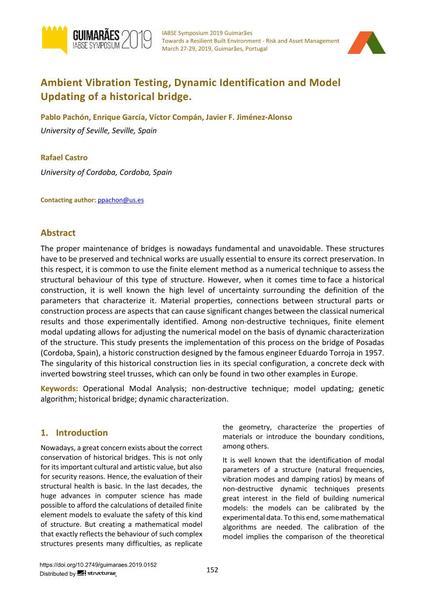Ambient Vibration Testing, Dynamic Identification and Model Updating of a historical bridge.

|
|
|||||||||||
Bibliografische Angaben
| Autor(en): |
Pablo Pachón
(University of Seville, Seville, Spain)
Enrique García (University of Seville, Seville, Spain) Víctor Compán (University of Seville, Seville, Spain) Javier F. Jiménez-Alonso (University of Seville, Seville, Spain) Rafael Castro (University of Cordoba, Cordoba, Spain) |
||||
|---|---|---|---|---|---|
| Medium: | Tagungsbeitrag | ||||
| Sprache(n): | Englisch | ||||
| Tagung: | IABSE Symposium: Towards a Resilient Built Environment Risk and Asset Management, Guimarães, Portugal, 27-29 March 2019 | ||||
| Veröffentlicht in: | IABSE Symposium Guimarães 2019 | ||||
|
|||||
| Seite(n): | 152-159 | ||||
| Anzahl der Seiten (im PDF): | 8 | ||||
| DOI: | 10.2749/guimaraes.2019.0152 | ||||
| Abstrakt: |
The proper maintenance of bridges is nowadays fundamental and unavoidable. These structures have to be preserved and technical works are usually essential to ensure its correct preservation. In this respect, it is common to use the finite element method as a numerical technique to assess the structural behaviour of this type of structure. However, when it comes time to face a historical construction, it is well known the high level of uncertainty surrounding the definition of the parameters that characterize it. Material properties, connections between structural parts or construction process are aspects that can cause significant changes between the classical numerical results and those experimentally identified. Among non-destructive techniques, finite element modal updating allows for adjusting the numerical model on the basis of dynamic characterization of the structure. This study presents the implementation of this process on the bridge of Posadas (Cordoba, Spain), a historic construction designed by the famous engineer Eduardo Torroja in 1957. The singularity of this historical construction lies in its special configuration, a concrete deck with inverted bowstring steel trusses, which can only be found in two other examples in Europe. |
||||
